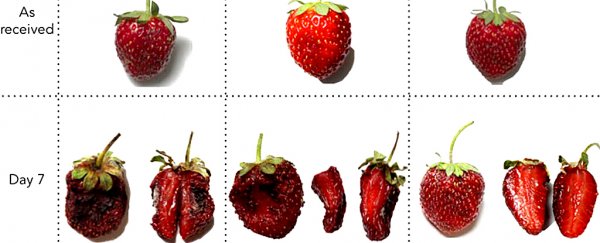Our kitchens might be about to get a whole lot more sustainable, with researchers announcing the development of a new type of edible food wrap that can keep fruit fresh for more than a week - without a fridge or plastic.
That's incredibly promising, seeing as researchers have shown that we're tossing out so much plastic these days, that by 2050, there'll be more plastic than fish in our oceans.
Unfortunately, one of the things we rely on plastic for the most is keeping our fruits and vegetables fresh between the farm and our shelves - and that's an important job, seeing as an estimated half of the world's fruit and vegetables are lost because they go bad before people can eat them.
But researchers might have found a more sustainable alternative: silk. They've developed a new type of edible, spray-on coating from fibroin - the insoluble protein that makes silk so tough.
To use its protective properties on produce, the researchers dipped strawberries and bananas into a solution of fibroin, and then exposed the fruit to water vapour under a vacuum for varying amounts of time. This allowed them to produce different percentages of coatings, which they call beta-sheets.
The more beta-sheets, the thicker the silk coating is, but even at its highest concentration, the coating was only 35 microns thick, which is pretty much invisible to the naked eye.
In future, this coating could be sprayed on before fruit and vegetables leave the farm.
The coated fruit was then stored at 22 degrees Celsius alongside uncoated produce for seven days. At the end of the experiment, the fruit with the highest percentage of beta-sheets was still plump and fresh, while the uncoated fruit was discoloured and had lost its texture.
You can see the strawberries in the image above, with the fruit with no coating on the left, 23 percent beta-sheet coating in the middle, and 58 percent beta-sheet coating on the right.
Further testing revealed that the silk coating had actually slowed down the respiration of the fruit.
"The beta-sheet content of the edible silk fibroin coatings made the strawberries less permeable to carbon dioxide and oxygen," said lead researcher Fiorenzo G. Omenetto from Tufts University in Massachusetts. "We saw a statistically significant delay in the decay of the fruit."
Bananas were green when they were coated, and they still ripened under the silk wrap - but more slowly than uncoated fruit. The also held their shape better - a 200-g weight placed on the uncoated banana sank into its flesh, while the coated bananas stayed firm.
 Omenetto et al., Scientific Reports
Omenetto et al., Scientific Reports
If that all sounds too good to be true, there is one important thing the researchers haven't tested as yet, and that's whether the fruit's taste has been compromised at all as a result of the coating.
But, publishing their work in Scientific Reports, they note that silk fibroin "is generally considered flavourless and odourless, which are compelling properties for food coating and packaging applications".
They also determined that nothing toxic was created by the food wrap that might make it less edible, and it came out fine. "For all the elements considered, the detection values were significantly below the toxicity levels in drinking water, as per World Health Organisation guidelines," the researchers write.
The hope now is that the team can scale-up the production of this new coating and eventually make it cheaper and easier for farmers and supermarkets to use than plastic. The ultimate goal is to keep food fresher for longer, without having to jeopardise the oceans to do so.
We really hope this works.
